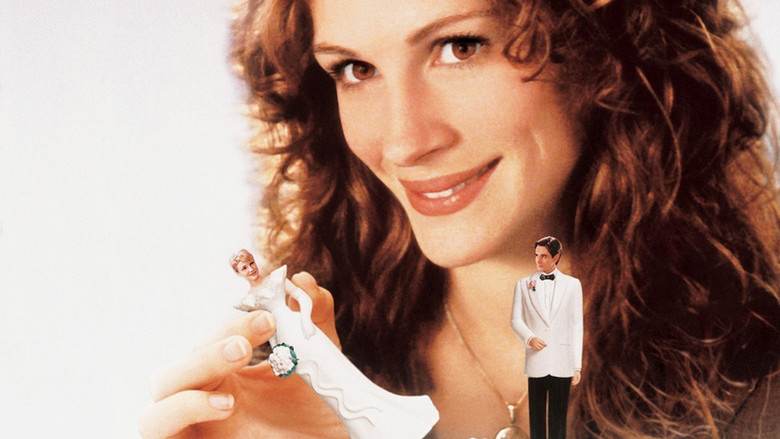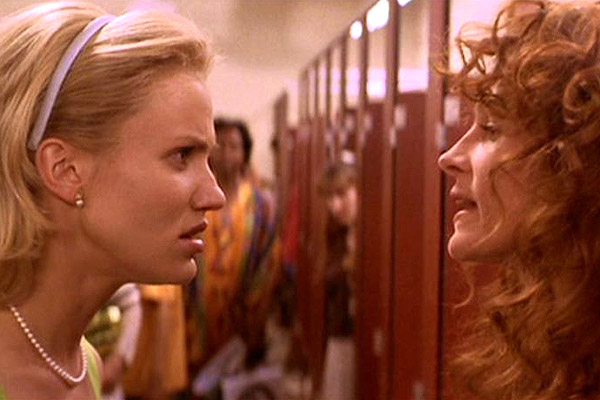Following on from “Why Pretty Woman Should Be Considered a Feminist Classic,” comes the eagerly awaited second installation of my thrilling series: “Julia Roberts Films That Other Writers On Bitch Flicks Hated But That I Actually Really Liked And Here’s Why” (currently seeking suggestions for a snappier title). So, is My Best Friend’s Wedding really a “Right-wing Nightmare Interpretation of Women”? Must every portrait of women be positive? Isn’t there room to satirize the negative? Watch that sugary opening with its singing bride and chorus of bridesmaids again. See the bridesmaids literally making the “see no evil, hear no evil, speak no evil” pose? If P. J. “Muriel’s Wedding” Hogan’s tongue gets any farther into his cheek, he’s going to bite it off. Julia Roberts’ demented and devious Julianne Potter is not a role model. My Best Friend’s Wedding is, rather, a brilliantly acid, deadly accurate takedown of narcissistic and destructive tendencies in the romcom genre. Such as…
Positional Superiority

Positional superiority refers to a superiority that is assumed, not because of superior ethics or behavior, but because of a character’s position in the film. In practice, it means that we will endlessly justify the behavior of protagonists, because we are conditioned to identify a film’s protagonists with ourselves. In a traditionally male genre like an action movie, this narcissism of positional superiority asks us to sympathize and justify our hero in all his casual slaughter of enemy goons. As Austin Powers reminded us, nobody thinks of the families of the henchmen. In a traditionally female genre like romcom, positional superiority means that any attraction felt by the heroine will be “true love,” justifying her in going to any lengths to defeat her deluded and conveniently obnoxious love rivals, to win her trophy man.
In My Best Friend’s Wedding, all the positional superiority is on the side of Julianne Potter. We are set up to believe that Julianne Potter will be successful in winning her best friend’s love for several reasons. Firstly, she is our heroine. Secondly, she is played by America’s sweetheart, Julia Roberts, whose star power tilts us in her favor. Thirdly, she is in a romcom, a genre that conventionally sets up weddings to be interrupted by “true love.” In everything but ethics, Julianne is the clear favorite. Any normal romcom should reward her “wacky” exploits. But My Best Friend’s Wedding is different. The film takes gleeful delight in testing exactly how many “underhand, despicable, not even terribly imaginative” schemes Julianne can undertake before losing our sympathy. Can she force her gay best friend into a humiliating charade of fake engagement? Can she forge a letter that risks her true love’s job? Can she steal a bread van? How far does wackiness have to go before it becomes conniving delusion? Finally, the film forces Julianne to admit that she is not only “the bad guy” rather than the heroine, but the lowest of the low, “the pus that infects the mucus that cruds up the fungus that feeds on the pond scum.” Her redemption lies in regaining her self-respect through the moral courage of total honesty, not rewarding her narcissism by the convenient prize of a trophy man. It’s a sharp reminder that “bad guy” status should depend on a character’s action and not their position in the story. Our narcissism makes it hard for us to accept such an even-handed justice for the character we identify with ourselves. As Julianne puts it, “Getting what you deserve isn’t fair!”
The Pretty-Ugly Girl

Consider, if you will, romcom The Truth About Cats And Dogs. By shutting one’s eyes and listening to Audrey Wells’ sharp script, it is possible to see that this is a smart updating of Cyrano de Bergerac for women. But the role of the physically unattractive girl with a face for radio is played by a bloomingly youthful Janeane Garofalo in a rather unflattering cardigan. A staple of the romcom genre is the “pretty-ugly girl,” usually a conventionally attractive brunette in faintly unflattering clothing, who is set up as the underdog in a rivalry with a conventionally attractive blonde that we are allowed to perceive as “pretty.” Pitting our heroine Julianne, a brunette with quirkily masculine tailoring, against rival Kimmy, a blonde who wears pink, is a classic use of the “pretty-ugly girl” as supposed underdog. Aside from contributing to society’s rampant body dysmorphia, the pretty-ugly girl fuels female rivalry. It gives women permission to hate or disdain love rivals for their conventional beauty while, at the same time, assuring us that conventional beauty is required of our heroine, even if she is a brunette. Encouraging women to strive to be conventionally beautiful while hating rivals for their own beauty is a recipe for permanent catfight.
A close relative of the pretty-ugly girl is the nonconformist-conformist girl. We tend to approve of Julianne Potter, because she is independent, quirkily cynical, career-oriented and doesn’t let herself be defined by a man. We tend to despise Kimmy, because she is prepared to sacrifice her education and her ambitions to settle down. So, we cheer for our Julianne to be rewarded… by settling down with Kimmy’s man. When you think about it, that would be more ironic than both rain on your wedding day and a free ride when you’ve already paid. The resentful ego of the pretty-ugly girl is revealed when Julianne calls herself the jello to Kimmy’s creme brulee. Though apparently self-deprecating, Julianne is actually citing her underdog status as the reason why she will win out in the end, because Michael feels “comfortable” with her. As Kimmy desperately hopes that she can become jello to win his love, Julianne snaps, “You’re never gonna be jello!” It is no coincidence that women of other body types, races and ages appear as spectators at the climactic bathroom showdown, as Julianne is finally forced to see her actions as they appear to others, outside her comforting bubble of pretty-ugly aggrieved entitlement.
“Hubble”

Sex And The City famously used the single word “Hubble” to explain Mr. Big’s marriage to a woman who was not Carrie. Referencing romcom tradition through the classic The Way We Were, the gang conclude that Big simply couldn’t handle the quirkiness and intelligence of Carrie, and was forced to settle on a safer, more boringly predictable bride. Her faith in “Hubble” may play a role in Carrie’s embarking on an affair with Big, one that the show paid lip service to criticizing but finally vindicated through Carrie’s own eventual happy ending with Big. If the pretty-ugly girl justifies aggrieved entitlement, body dysmorphia and resentment of more conventionally attractive rivals, then “Hubble” discredits and diminishes the man’s own right to choose. Julianne Potter is close to Carrie Bradshaw in many ways – she is newspaper columnist with a mass of curly hair and a cynical take on romance, who nevertheless winds up wanting the fairy tale. Over the course of the film, she will do anything to win Michael’s love – anything apart from telling him the truth and allowing him to make an informed choice. Her deluded assumption that she is justified in making his choice for him reaches a climax as she steals a bread van to chase him, leaving best friend George to remind her that no-one is actually chasing her. In a romcom genre where interrupted weddings have been traditional since the screwball climax of 1934’s Oscar-winning It Happened One Night, leading our heroes to regularly agree to marry incompatible and obnoxious partners for the flimsiest of manufactured reasons, My Best Friend’s Wedding reminds us that marriage is a commitment rarely undertaken without sincere love, however painful it may be to acknowledge and accept that fact. When all is said and done, “Hubble” is only a cowardly excuse to avoid accepting a man’s right to choose elsewhere, or the possibility that he may have good and valid reasons for doing so.
The GBF
Stanford of Sex And The City has a thankless role. Never invited to brunch with the girls, his role seems confined to the repeated assurances that Carrie is “fabulous.” Their relationship is so one-sided that one suspects that the gay male authors of the show are satirizing the narcissism of their female friends. If so, it was a satire that was lost on a large segment of the target audience. The GBF, the Gay Best Friend as fashion accessory and ego prop, was born. Superficially, Rupert Everett’s George appears to be a classic GBF. His role is a supporting one, offering emotional support and finally playing Julianne’s date and consolation prize at the wedding dinner. However, George is a very different animal from the usual GBF. Notice how all of Julianne’s calls are inconvenient interruptions to George’s full, satisfying life that emphatically does not revolve around his friend. We are given glimpses of his dinner parties with his long-term partner and his enjoyment of book readings. When he is dragged into a pretended engagement with Julianne, as part of her hair-brained scheme to provoke Michael’s jealousy, he protests loudly, mocks the engagement as “against God’s plan” and humiliates Julianne as his revenge. George’s comparing of their pairing to “Rock Hudson and Doris Day” evokes Hollywood’s long history of gay men forced into the closet for the convenience of female admirers. Though his life beyond Julianne is only briefly sketched, it paints her as the needy hanger-on in the relationship, making his final appearance at the wedding into an act of mercy and true friendship.
From the GBF to the pretty-ugly conformist-nonconformist girl, from positional superiority to “Hubble,” My Best Friend’s Wedding is superbly knowing as it expertly raises every clichéd plot twist and trope in the romcom playbook, before stripping them bare in favor of honesty, moral courage and the belief that life really does go on without a man. Surely that’s a message we can get behind?
Brigit McCone is shameless in her love of a good romcom (including Fight Club), writes and directs short films and radio dramas. Her hobbies include doodling and singing terrible karaoke.


I always liked ‘My Best Friend’s Wedding’ and I always felt like many critics and audiences missed the point of the film. I thought it was brilliant to make the protagonist the villain, which we don’t typically see with women leads. I also loved its commentary on rom-com tropes. Great article!
I think the ultimate message of the movie is a great one that goes against the rom com trope. Julianne doesn’t get the guy, and she’s going to be just fine. It’s not a tragic ending. She’s not lost and sad and life ruined. She did the right thing and let him go.
Yessss.
It would definitely do the stale predictability of romcom a world of good if there were more stories that allowed the central romance to fail. I’d love a bit more of a feeling of risk and danger to romcom safety.